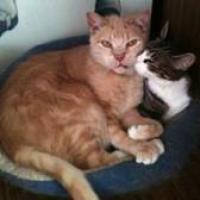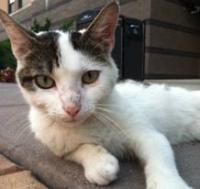FIV in Cats
Feline Immunodeficiency Virus, also called cat AIDS, feline AIDS, and FIV in cats, is one of the three most common and serious cat viruses. Many people still confuse FIV and Feline Leukemia by thinking they are the same disease or believe they cause identical symptoms and share methods of transmission. In addition, many are not even aware of FIP, or Feline Infectious Peritonitis, which is the number one killer of kittens. FIV, FeLV (Feline Leukemia), and FIP are three separate diseases and it is important to know the differences between them. This article covers FIV positive cats only.
FIV (Feline Immunodeficiency Virus) is a virus that cats acquire from other FIV cats. It damages the immune system, making it weaker and unable to fight infections that would normally not cause a serious disease. FIV positive cats can become very ill, even to the point of death, from bacteria and other organisms that are normally present in the environment and do not cause problems for cats without FIV.
Feline Immunodeficiency Virus: Transmission
A major difference between Feline Leukemia and FIV in cats is in the mode of transmission. The primary method by which a cat acquires FIV is through bite wounds from other FIV positive cats. For this reason, outdoor cats are at greatest risk, especially unneutered males who are more likely to get into fights and bite each other.
There are other ways to catch the feline immunodeficiency virus, although they are less common. Kittens can acquire the virus from their moms either during birth or from her milk when they nurse. However, this does not happen with many kittens. The virus could also be transmitted from cat to cat during mating, but again, this is not common. By far, the most common method of transmission is through the bloodstream, which occurs during bite wounds.
Who Can Contract FIV?
Many studies have been done and much data evaluated and there has been no data to suggest that FIV in cats can infect a person. However, other cats can certainly be infected by your kitty and he, therefore, should be kept indoors at all times. This also prevents your FIV positive cat from coming into contact with many bacteria, viruses, and parasites that may be mild for a negative cat, but life-threatening for a positive cat. There is some controversy over whether preexisting negative cats should continue to live with a positive cat. There is no complete guarantee that it is safe, but if you have a peaceful cat household without aggressive fighting it is possible for negative cats to live with a positive cat without contracting the disease. Cats that live together don't generally bite each other hard enough to break the skin even during rough play.
Signs of FIV in Cats
- Infections that occur multiple times, anywhere in the body, but especially the upper respiratory tract, skin, urinary tract, and eyes.
- Severe inflammation of the gingiva, the tissue around the teeth, as well as inflammation often affecting the entire mouth and the throat.
- A fever that is not responsive to treatment or goes away but comes back repeatedly
- Weight loss
- Decrease in appetite
- Decrease in activity, less social
- Haircoat that is dull and in poor condition generally
- Behavioral changes or even seizures and other neurological conditions
- Cancer anywhere in the body
- Blood diseases
- In-tact (not spayed) females who fail to become pregnant or if they do, often abort the kittens.
Many veterinarians report that the most consistent sign of Feline Immunodeficiency Virus infection are problems in the mouth. However, oral problems as well as the other symptoms of FIV in cats listed above are common to diseases other than Feline Immunodeficiency Virus as well. A veterinary exam and various diagnostic tests are required to determine the exact cause of such symptoms.
Diagnosis of FIV in Cats
There are very few cats that should not be tested for FIV. New cats added to your household, sick cats, cats that spend any time outdoors, cats with any type of chronic mouth inflammation, kittens born to parents where either is of unknown FIV status, and any cat with a bite wound that could be from another cat should all be tested.
There is a simple blood test that can detect antibodies to FIV in cats. This test is performed in your veterinarian's hospital or is sent to an outside laboratory. It is very important to not make critical decisions based on one positive test. It is very important that any positive test be confirmed by repeating it and/or a different type of test. To confirmation a positive test result, we can use a method called the Western Blot exam.
- Kittens can have false positive tests due to the passage of FIV antibodies from a positive mom to the kittens. These kittens do not really have the virus. These antibodies will decrease during the first 6 months of life, by which time the test will be negative. Repeated testing during this 6 month period is important. Most of these kittens will end up being FIV negative.
- A cat carrying the FIV virus can test negative due to the fact that the virus can be incubating for a period of 2 to 4 months. If you have a cat that has been exposed to a positive cat or one whose background is unknown, it is important to retest even negative cats 2-4 months later.
- A cat can also test positive for FIV after having been vaccinated, so it's also important to microchip your kitty for identification. According to Cornell University, there is a test that is not yet commercially available that can differentiate between a vaccine positive and a true positive from infection.
Treatment for FIV positive Cats
Treatment for FIV in cats is primarily symptomatic and supportive.
There is no cure for Feline Immunodeficiency Virus. However, with excellent home care and regular veterinarian exams with early attention to any problem that arises, it is reasonable to expect that an FIV positive cat can live many years. Some studies have shown that indoor FIV cats with good home and veterinary care can live as long as negative cats. Some kitties have been treated with various human immunodeficiency virus (HIV) drugs with variable success. If you have an FIV positive cat, speak to your veterinarian about these options.
The life span of an FIV positive cat is quite different from one with feline leukemia or feline infectious peritonitis (FIP).This varies, of course, depending on the time of diagnosis. If your kitty is already ill when diagnosed, then that time can be very short. However, if your cat is very healthy and has just contracted the disease, it is reasonable to hope that there will be many years of life remaining.
Prevention
It is actually very easy to prevent the spread of FIV in cats. If you keep your kitty inside and away from any FIV positive cats or cats that have not been tested, he cannot become infected. In reality, however, there are cat parents that do not believe their cats should have to spend all their time indoors. You should just be aware that every time your kitty is outdoors, he is at risk, even if he has had the FIV vaccine. There is no such thing as a perfect, 100% reliable vaccine. This is true of vaccines in general and the FIV vaccine, in particular, has problems. Not only does the virus have a variety of subtypes that are different from one another, but it can also turn into new subtypes and it is impossible to create a vaccine to protect against all of them.
An additional problem with the vaccine is that cats test positive if they have been vaccinated. It is impossible to distinguish FIV cats that are truly positive and have the virus from those whose positive reaction is caused by the vaccine. This factor can lead to unnecessary euthanasia of a healthy cat. There are experimental tests that attempt to distinguish between a truly positive cat and one who has been vaccinated, but they are not reliable at present. If you have a cat that has been vaccinated against FIV in cats, it would be wise to microchip them and also place a tag on their collar that indicates they are vaccinated, not truly positive.
If your cat goes outdoors and you decide to have him vaccinated with the FIV vaccine, be sure and have the test run first so you know before vaccination that he definitely doesn't already have the disease.
All articles are reviewed and maintained by whiskerDocs team of veterinary experts.





